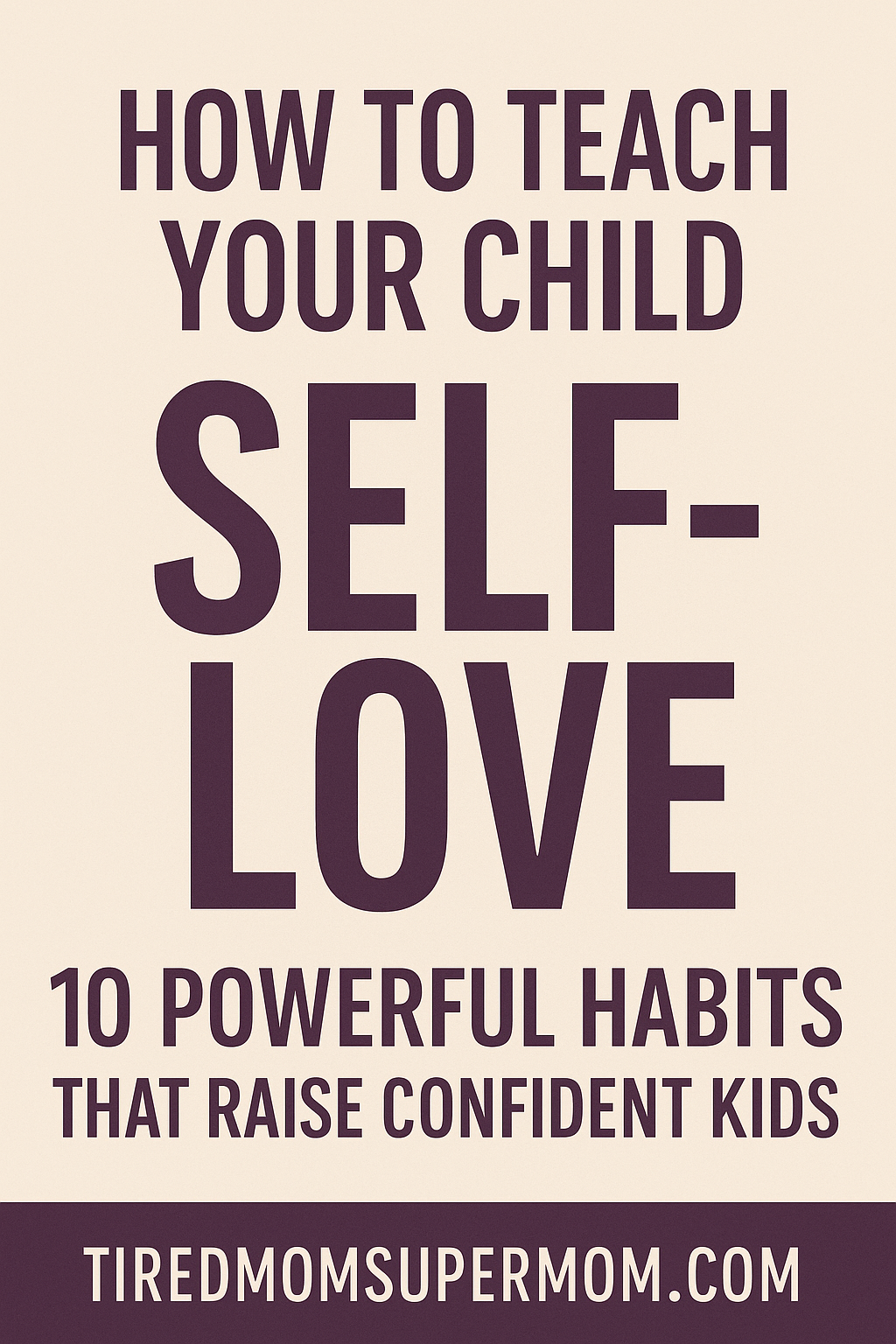How to Teach Your Child Self-Love: 10 Powerful Habits That Raise Confident Kids
Wondering how to teach your child self-love in a meaningful way? These habits will help you raise a child who feels confident, secure, and proud of who they are.
Teaching your child self-love helps them build confidence, resilience, and emotional well-being for life.
In this guide, discover 10 effective habits that show you how to teach your child self-love—with practical tips, examples, and simple tools that work in everyday parenting.
Heads up: This post may include affiliate links. As an Amazon Associate, I earn from qualifying purchases—at no extra cost to you. Full privacy policy and disclosure here.
Why It’s Important to Teach Your Child Self-Love Early
When children learn to love themselves early, they develop a strong inner foundation. That means fewer meltdowns, more confidence, better friendships, and a healthier mindset when facing challenges. And in a world full of comparison and pressure, self-love is the greatest gift we can give our kids.
Whether your child is shy, sensitive, or bold and outgoing, these strategies will help them feel valued, heard, and proud of who they are.
10 Effective Tips on How to Teach Your Child Self-Love
Let’s break down how to teach your child self-love using simple, real-life parenting habits.
1. Speak to Them the Way You Want Them to Speak to Themselves
Children absorb the words we use. Harsh criticism often becomes their inner voice.
Try this:
Replace “Why would you do that?” with “Let’s figure out what happened.”
Say “You worked really hard on that!” instead of “Good job.”
🛒 Recommended Tool: Affirmation Cards for Kids – These are great for bedtime or lunchbox notes.
📌 Related: The Secret to Raising a Happy Kid
2. Teach Them to Name Their Feelings
Self-love starts with self-awareness. When kids can identify their feelings, they learn to treat themselves with compassion instead of shame.
Activity idea: Use a feelings chart or the Calm Down Corner method at home to talk about emotions daily.
Books and tools that reinforce how to teach your child self-love can make your efforts even more effective.
3. Model Self-Love Yourself
Your child is always watching. If you constantly criticize yourself, they will mirror it.
Try this: Say out loud, “I’m proud of myself for handling that calmly,” or “I love my strong legs that help me chase you around!”
4. Create a Daily Self-Love Ritual
Routine matters. Small daily actions can reinforce a strong sense of self-worth.
Ideas:
- Morning mirror affirmations
- Gratitude journaling before bed
- Drawing something they love about themselves
🛒 Try This: Gratitude Journal for Kids
5. Celebrate Effort, Not Just Achievement
Praising outcomes teaches children that they are only worthy if they “win.” Instead, celebrate the process.
Say:
- “You didn’t give up—that’s amazing!”
- “You kept going even when it was hard.”
📌 Related: Raise Confident Kids with These Simple Shifts
6. Help Them Discover Their Strengths
Instead of trying to “fix” weaknesses, focus on what makes them unique and powerful.
How to do it:
Ask open-ended questions for kids like:
- What makes you proud of yourself?
- What do you think you’re really good at?
🛒 Recommended: Strength-Based Workbooks for Kids
7. Let Them Fail—Safely
Failure is a key part of developing confidence and self-love. It teaches resilience and acceptance.
Instead of rescuing them, let them stumble a bit and offer support after the fact.
📌 Related: Kids Need to Learn to Listen the First Time
8. Cut Comparison Culture
Kids notice when we compare them—to siblings, friends, or even ourselves.
Do this instead:
Highlight individuality. “Your big ideas are what make you so special!” or “You always notice the details—that’s such a cool strength.”
9. Create Opportunities for Autonomy
Letting your child make small choices empowers them to believe their opinions matter.
Examples:
- Let them choose their outfit (yes, even mismatched socks!)
- Give them age-appropriate kids’ chores to build pride
10. Support Their Emotional Toolbox
Teach them coping skills they can use when self-love is hard.
Helpful tools:
- Breathing exercises
- Journaling
- Mindfulness or meditation apps
- Quiet alone time
📌 Related: Apps for Kids That Don’t Require Wi-Fi
🛒 Helpful Buy: Mindfulness Kits for Kids
❓ FAQ: Teaching Kids Self-Love
What is self-love for children?
Self-love in children means having a positive sense of self-worth, confidence, and emotional acceptance. It allows kids to feel secure in who they are, even when they make mistakes.
Why is it important to teach kids self-love early?
Teaching self-love early helps children develop strong mental health, reduces anxiety, and builds resilience. It also strengthens their relationships and ability to face life’s challenges.
What’s the best age to start learning how to teach your child self-love?
The earlier, the better! Even toddlers can begin learning foundational emotional language and confidence skills.
What are signs my child needs more support in this area?
If your child is constantly self-critical, avoids trying new things, or frequently compares themselves to others, it may be time to focus on boosting self-love and emotional support.
Do books help with teaching self-love?
Yes! Books are powerful tools. Choose titles that focus on confidence, emotions, and uniqueness. Look for highly rated children’s books like I Am Enough or The World Needs Who You Were Made to Be.
Final Thoughts on How to Teach Your Child Self-Love at Home
You don’t need to be perfect. You just need to be present. Children thrive when they feel seen, valued, and accepted for who they are. These 10 strategies help you build that foundation.
With daily support, emotional language, and the right tools, your child can grow into someone who respects themselves—and others—deeply.
📌 Save this post to your parenting board and share with other moms who are learning how to teach your child self-love in a deeper, more practical way.

